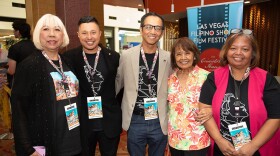You might expect someone who routinely wrestles with such pervasive issues as race and gender discrimination to take philosophical questions in stride. Yet when I asked KB Brookins, who frequently ponders the sources of their own discrimination on multiple fronts, whether they felt it was futile to fight for justice within a system that is itself inherently corrupt, they paused. “That’s a large question.” Not that they didn’t want to answer — as you’ll see below (or hear in the podcast), the response is a doozy. Perhaps Brookins wasn’t expecting such a close read from Las Vegas. But that’s been a constant among the Black Mountain Institute’s Shearing Fellows we’ve interviewed: delight at the unexpected literary gem in the heart of Sin City. My conversation with Brookins started there …
KB, you arrived in Las Vegas in mid-August. What has your experience been like up to now?
So far, it's been really cool immersing myself in the desert landscape. I've never lived in the West before, and my first thought was like, “Oh my God. It's like, so hot here!” Which is so rich for me, because I'm from Texas, which is known for being hot as well. But it’s a humid heat, and here it's a dry heat. And I was like, “Okay, my body has to adjust.”
I've been very charmed to see just how robust the literary community is here. I've been going to a number of events at the Writer's Block. I've been going to, of course, BMI events. And I've been going to events at the LGBTQ+ Center … They have a creative writing group there, and then also (there’s) just the added plus of health care that they provide there. So, it's been cool to kind of get immersed in those things.
In your memoir, Pretty, you talk about the positive effect Frank Ocean's album Channel Orange had on you. A fair amount of music criticism — and musical references in general — is woven throughout the book. What has music done for you and your work, maybe both good and bad?
I was a very introverted kid. I didn't have a lot of friends growing up, just because I was very anxious and very introverted. And so, my first friends in my head were just the musicians that I listened to on my little CD player. … My family had a gospel troupe, and so I would listen to the songs that they would sing, and then I would also listen to, contemporary R&B, hip-hop, some country, some pop — I just had a very vast musical taste, perhaps because I came from musicians, and also because I just spent so much of my time in my head, in the back seats of cars. So, I had all this time with music in my headphones. So, in that way, it feels like almost self-soothing.
And then when translating that now to my literary practice: When I think of a (written) line, I'm thinking a lot about sound. And I think that does come from me just being interested in music from a young age, especially rap, where it is so sound-based. It is so based on the words that you're saying, rhyming or alliteration or assonance. I feel like a great way to teach those basics of English is by just listening to music, and especially how rappers kind of contort and use their words in order to make a rhyme or make something beautiful happen. And I really aim to do that on the page.
I both read and listened to your book, partly because you narrate the audio book yourself — I wanted to hear you speak your own words — and partly because, as a writer and radio producer myself, I'm interested in the intersection of writing and audio. I felt that the parts that I listened to gave me a fuller understanding of your writing, because there's so much poetry and so much music in it. What was it like recording it?
Recording the book made me have such reverence for people who do radio shows and voice actors! … I've always cared equally about a book's oral life as much as its text. I'm working within a fraught medium in the sense that text and spoken word are not ever going to be the same, one-to-one.
I think the audiobook really is like me holding your hand a little bit and ushering you through the process of reading this book. And I recognize that this is not a memoir in the traditional sense: It has essays, it has poems, it has archival photos from my own life. And so, an audiobook gives me the opportunity to kind of mesh it all together, make you understand why these mediums might be being used. Because this is my story, and I'm a non-normative person, so I'm not going to give you a normative memoir.
There are parts of the book where you address American politics directly, taking leaders to task for policies that oppress Black and LGBTQ people, perpetuate poverty, undermine good physical and mental health, and other malfeasance. Is the US and or Texas worth reforming? Is the resistance effective, or is any effort to work within that system an implicit acceptance of it?
That's a large question. I will speak for myself in that I lived in Texas for almost 30 years. I know that there are good people there. I know that there is great organizing happening in the Lone Star State. I know that the reason why the political landscape looks like it looks is not a matter of people wanting it to be that way. And I also know that a lot of people feel so disenfranchised that they don't necessarily interact with the political system.
I know that I’ve spent many days at the Texas capitol. In 2023 a certain number of politicians were trying to pass a ban on drag shows. … The bill was originally designed to restrict kids from attending drag shows, but its most recent version seeks to criminalize any live performance that the bill defines as sexual. … I love my home, and I wish that my home could love me back. And I think, truly, it's just the chokehold of fascism, which we're kind of talking about now, and the chokehold of people intentionally just disenfranchising people like me in the state so much that they feel like they have to leave, or so much that they feel like they have to just get their day-to-day done and not put participate in the political system
So I want to answer your question with saying, ‘Yeah, people are worth saving. I don't know if systems are, but I know that people are.’ And I think that when we move toward each other and when we actually talk to each other about these issues, things change. … There are so many solutions to (disenfranchisement). One of them is art. One of them is policy. Another one of them is running for office. Another one of them is doing something that makes the day-to-day lives of people better.
Your memoir also includes thoughts on femininity, but it's above all a meditation on masculinity. How would you summarize your thoughts on masculinity?
I feel like this book was really me trying to figure that out for myself. When someone says, “Oh, you're a masculine” — besides the clothes that I wear, what does that actually mean? (I’m) trying to come to terms with some of the traumas I've experienced at the hands of masculine people.
(The book is) also me trying to come to terms with the toxic masculinity that I have, at times, exhibited, and also trying to figure out how I create a masculinity that is not a threat, that is not something that is spoken of negatively, that is not seen as like a deficit in me. Because I feel like a lot of times throughout my life, people have, especially through my childhood, teased me about being more masculine. And I had to really figure out for myself what kind of masculine am I going to be, and how am I going to make sure that that masculinity is healthy, is inviting, is something that actually feels like, to childhood KB, something safe to be around.
And really the answer that I've come to is taking it day by day. Trying to be a good person to the people around me and to my chosen family, and to literal strangers as well. Because that's how we build a better world.










